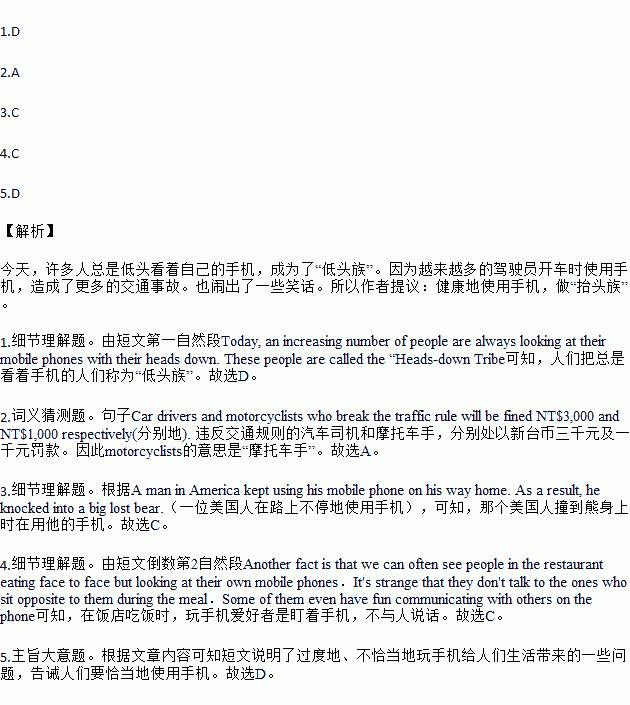题目内容
Today, an increasing number of people are always looking at their mobile phones with their heads down. These people are called the “Heads-down Tribe(低头族)”. Are you a heads-down tribe member? Heads-down tribe members now can be seen everywhere.
More and more traffic accidents are happening because more drivers use mobile phones when they are driving. In order to make drivers pay more attention to driving, some new traffic rules have been made. For example, people who use mobile phones while driving in Taiwan are fined (罚款). Car drivers and motorcyclists who break the traffic rule will be fined NT$3,000 and NT$1,000 respectively(分别地).
As we can see above, using mobile phones may cause accidents and even cost a lot of money. Also, more and more interesting and strange facts happen to the “Heads-down Tribe”. Let’s have a look at an interesting TV report. A man in America kept using his mobile phone on his way home.
As a result, he knocked into a big lost bear. When he lifted his eyes from the phone,he was so afraid that he turned around and ran away quickly. Another fact is that we can often see people in the restaurant eating face to face but looking at their own mobile phones. It’s strange that they don’t talk to the ones who sit opposite to them during the meal. Some of them even have fun communicating with others on the phone.
Mobile phones are helpful and necessary tools for modern life. Are mobile phones good or bad? It depends on how people use them. Let’s be “healthy” users and try to be the “Heads-up Tribe”.
1.What do we know about the“Heads-down Tribe”?
A. They are cool children.
B. They are dangerous driver.
C. They are good at using the Internet.
D. They are always looking at their mobile phones.
2.What does the underlined word“motorcyclists”in the passage mean in Chinese?
A. 摩托车手 B. 手机使用者 C. 低头族 D. 汽车司机
3.The American was_______when he knocked into the bear.
A. driving a car B. going to work C. using his mobile phone D. singing a song
4.According to the passage.What do the“Heads-down Tribe"do when they eat in a restaurant?
A. They look at their own mobile phones.
B. They don't talk to the people who sit opposite.
C. Both A and B.
D. They talk to the strangers who sit next to them.
5.What is the main idea of the passage?
A. Let's try to be the "Heads-down Tribe".
B. Mobile phones are helpful and necessary.
C. Mobile phones are not good for people.
D. We should use mobile phone rightly.

